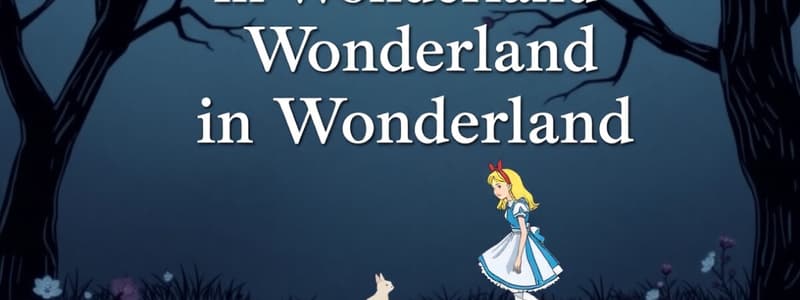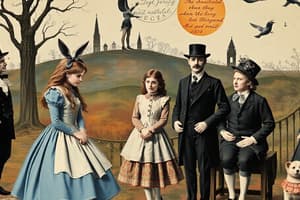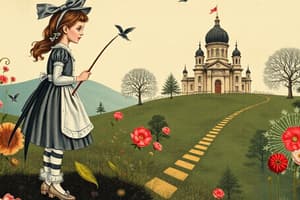Podcast
Questions and Answers
What is the pen name of Charles Lutwidge Dodgson?
What is the pen name of Charles Lutwidge Dodgson?
- Charles Dickens
- Mark Twain
- J.K. Rowling
- Lewis Carroll (correct)
Alice Liddell inspired the character Alice in 'Alice's Adventures in Wonderland'.
Alice Liddell inspired the character Alice in 'Alice's Adventures in Wonderland'.
True (A)
What year was 'Alice's Adventures in Wonderland' published?
What year was 'Alice's Adventures in Wonderland' published?
1865
Lewis Carroll was a mathematics teacher and enjoyed __________ and puzzles.
Lewis Carroll was a mathematics teacher and enjoyed __________ and puzzles.
Match the following works with their descriptions:
Match the following works with their descriptions:
What is one of the key roles of a title in a story?
What is one of the key roles of a title in a story?
A title can convey the entire narrative of a story.
A title can convey the entire narrative of a story.
What is the first thing Alice notices that leads her to follow it?
What is the first thing Alice notices that leads her to follow it?
Alice falls into a rabbit hole after noticing a White Rabbit.
Alice falls into a rabbit hole after noticing a White Rabbit.
Why is the title of a story important?
Why is the title of a story important?
What does Alice find when she looks through the keyhole?
What does Alice find when she looks through the keyhole?
The title cannot tell the whole _____ of the story.
The title cannot tell the whole _____ of the story.
Match the title purpose with its explanation:
Match the title purpose with its explanation:
The animals and birds in the sea of tears decide to have a __________ race.
The animals and birds in the sea of tears decide to have a __________ race.
Match the characters with their actions:
Match the characters with their actions:
What does the caterpillar give advice about to Alice?
What does the caterpillar give advice about to Alice?
The Cheshire Cat helps Alice by directing her to the Queen of Hearts's house.
The Cheshire Cat helps Alice by directing her to the Queen of Hearts's house.
What happens to the baby that Alice is given?
What happens to the baby that Alice is given?
Alice experiences identity issues while talking to a ______ who is smoking a hookah.
Alice experiences identity issues while talking to a ______ who is smoking a hookah.
Match the characters with their actions:
Match the characters with their actions:
What does the Queen of Hearts order to happen to the Cheshire Cat?
What does the Queen of Hearts order to happen to the Cheshire Cat?
Alice grows larger during the trial and is scolded by the Dormouse.
Alice grows larger during the trial and is scolded by the Dormouse.
Who wakes Alice up from her dream?
Who wakes Alice up from her dream?
Alice becomes insulted and tired of __________ and leaves the tea party.
Alice becomes insulted and tired of __________ and leaves the tea party.
Match each character to their action or role in the story:
Match each character to their action or role in the story:
What part of the story comes right before the climax?
What part of the story comes right before the climax?
The resolution of a story is always a happy ending.
The resolution of a story is always a happy ending.
What is the purpose of the exposition in a story?
What is the purpose of the exposition in a story?
The ________ is often regarded as the turning point of the story.
The ________ is often regarded as the turning point of the story.
Match the story element with its description:
Match the story element with its description:
Who is responsible for making decisions about costumes and props in a theatre production?
Who is responsible for making decisions about costumes and props in a theatre production?
A script is usually divided into acts and scenes.
A script is usually divided into acts and scenes.
What is the term used for the text of a drama?
What is the term used for the text of a drama?
A good actor can __________ a wide range of emotions.
A good actor can __________ a wide range of emotions.
Match the terms with their definitions:
Match the terms with their definitions:
What does the term 'audience' refer to in drama?
What does the term 'audience' refer to in drama?
The role of a narrator is to perform in a film or play.
The role of a narrator is to perform in a film or play.
What is the purpose of stage directions in a play?
What is the purpose of stage directions in a play?
Actors use __________ to wear specific costumes that fit their character.
Actors use __________ to wear specific costumes that fit their character.
Match the following drama concepts with their definitions:
Match the following drama concepts with their definitions:
Flashcards are hidden until you start studying
Study Notes
Lewis Carroll
- Charles Lutwidge Dodgson was an English mathematician who wrote under the pen name Lewis Carroll.
- He is known for his children's literature, especially Alice’s Adventures in Wonderland and Through the Looking-Glass.
- He enjoyed word games and puzzles, incorporating them into his works.
- One example is the riddle in Alice's Adventures in Wonderland: "Dreaming of apples on a wall, And dreaming often dear, I dreamed, that if I counted all, How many would appear?" The answer is ten, which is implied by the apple-counting context.
Titles and Storytelling
- A Title shouldn’t give away the entire story.
- Titles grab readers' attention and provide a general idea of the story.
Alice’s Adventures in Wonderland
- Alice falls down a rabbit hole into a fantastical world.
- She encounters various eccentric characters, including the White Rabbit, the Duchess, the Cheshire Cat, the Mad Hatter, and the Queen of Hearts.
- Alice experiences many changes in size, becoming large or small through her journey.
Story Elements
- Exposition introduces the characters and setting, laying the groundwork for the story.
- Rising action builds suspense and tension, leading towards the climax.
- Climax is the most exciting part of the story, where the main conflict is faced.
- Falling action resolves conflicts and leads towards the resolution.
- Resolution concludes the story, providing closure and tying up loose ends.
Theatre Vocabulary
- Audience refers to the spectators watching a play, film, or performance.
- Cast encompasses all the actors in a production.
- Character is any individual involved in a story, film, play, etc.
- Director oversees the production of a film, play, or performance.
- Narrator tells the story in books, plays, or films, sometimes providing additional information.
- Costumes are the clothing actors wear in a play.
- Make-up is used to transform actor's appearances.
- Props are objects used in a performance.
- Script is the written text of a play or film.
- Stage is the raised area in a theatre where actors perform.
- Acts are major sections of a play, typically separated by intermissions.
- Dialogue refers to the spoken words exchanged between characters.
- Play is a story written for performance.
- Roles/Parts are specific characters played by particular actors.
- Scene is a smaller segment of a play, often taking place in a specific location.
- Setting is the time and place where a story or play unfolds.
- Stage directions are instructions in the script that guide actors, directors, and set designers on how to perform and stage the play.
- Express refers to conveying emotions clearly through voice and body language.
- Learn your lines involves memorising the dialogue for a role.
- Perform means to act, sing, or dance for an audience.
- Project means to use your voice and body language expressively to reach the audience.
- Rehearse involves practicing a play or performance to prepare for the final performance.
Theatre Activity
- Cast represents actors in a performance.
- Character is an individual within a story.
- Director manages aspects of a theatrical production.
- Costumes are the clothes actors wear.
- Make-up is used to modify actor's appearances.
- Props are objects used in a performance.
- Dialogue is the spoken words used by characters.
- Audience refers to the spectators watching a performance.
- Stage is the raised area where actors perform in a theatre.
- Project means using voice effectively to reach the audience.
- Play is a story written for stage performance.
- Perform refers to acting, singing, or dancing for an audience.
- Script is the written text of a play or film.
- Acts are major sections of a play.
- Scenes are smaller units within a play, often with a specific location.
- Rehearse involves practicing a play or performance.
- Setting is the time and place where the story or play takes place.
- Express refers to conveying emotions clearly through voice and body language.
- Stage directions are instructions in the script for actors, directors, and set designers.
- Narrator tells the story in books, plays, or films, sometimes providing additional information.
Studying That Suits You
Use AI to generate personalized quizzes and flashcards to suit your learning preferences.




